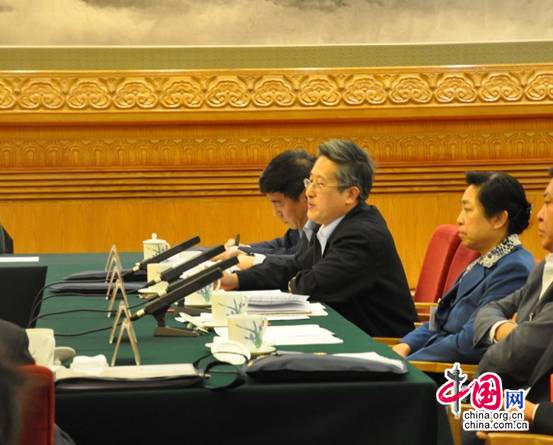Making 'migrant workers' history in 5 years
- By Zhang Junmian
 0 Comment(s)
0 Comment(s) Print
Print E-mail China.org.cn, March 8, 2013
E-mail China.org.cn, March 8, 2013
Ma Xu, a Beijing delegate to the first session of the 12th National People's Congress (NPC) said during a speech that he hopes the term "migrant worker," low-income individuals who leave their rural hometowns in search of work in larger urban areas, will no longer be relevant within five years.
|
|
|
Ma Xu, a Beijing delegate to the first session of the 12th National People's Congress (NPC), speaks while attending a panel discussion on March 6. [China.org.cn] |
"It's critical to integrate migrants into mainstream urban society so as to create the development bonus of urbanization," Ma said while attending a panel discussion on March 6.
"When China's urbanization rate rises by 1 percentage point, 13 million people from rural areas will have relocated to major urban areas, bringing with them a consumption potential of 170 billion yuan," he said. Ma is also the director of the National Research Institute for Family Planning.
According to Ma, China has a total of 260 million rural-urban migrants, and individuals born after the 1980s are beginning to represent a growing majority of migrant workers. They travel with their whole family in hopes of creating a new home, but often fail to integrate into city life due to a variety of policy restrictions.
Figures indicated that around 25 million migrant children are relocated into urban centers, while the number of children and seniors who are left behind in the rural areas number 70 million and 40 million, respectively, he said.
Ma stressed the importance of permanently moving migrant workers into urban areas. He said that the government needs to take into consideration the development of human resources of the floating population, with the migrant workers as the greatest group, in its urbanization plan, so as to make history the word "migrant worker" in China within five years.
To reach this goal, special funds need to be allocated to create a occupational skills training system for migrant workers with programs designed to help them start their own businessnesses.
Ma suggested that the integration of new city dwellers should be included in China's urbanization plan, and detailed plans should be designed as soon as possible.
"There's a saying in the international community that China's urbanization and the United States' high-tech industries will be the two factors influencing human development during the 21st century," Ma added.
China's urbanization rate passed 50 percent in 2011, and the government aims to have this figure reach 60 percent by 2020.
The urbanization rate of developed economies in Europe and the United States usually stands at 80 percent.







Go to Forum >>0 Comment(s)